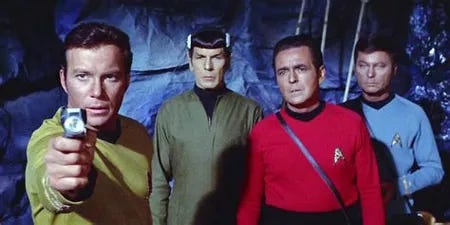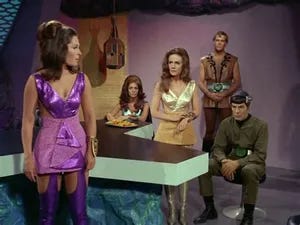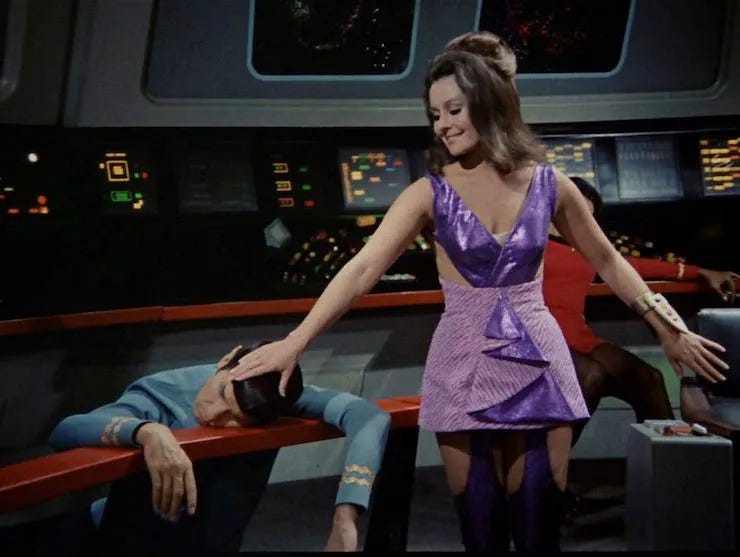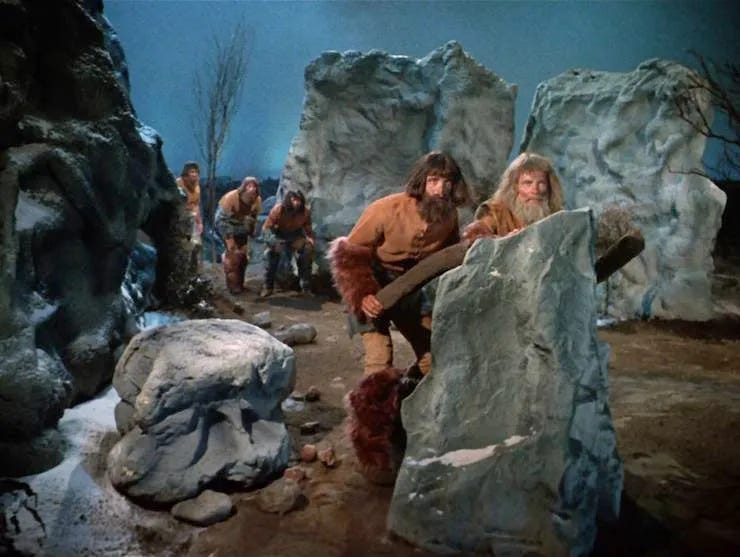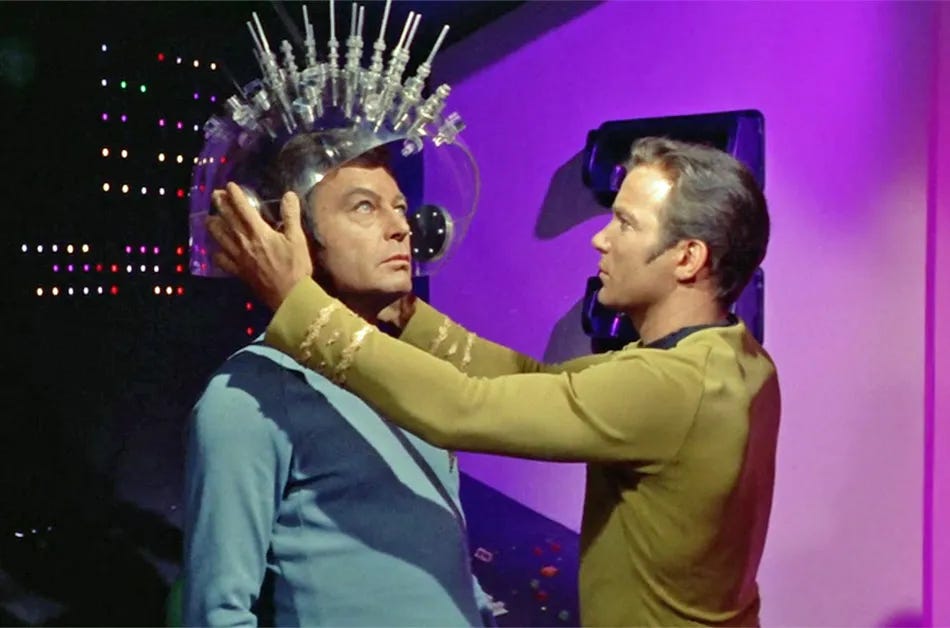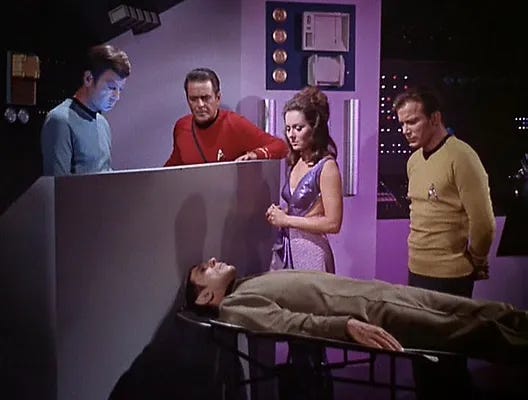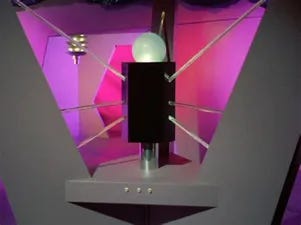Exploring the Battle of the Sexes in the Original Star Trek Episode “Spock’s Brain”
Second in a Series Exploring the Classic Science Fiction Show Through a Faith-Based Lens
It’s often said that women have a civilizing effect on men. Without that female influence in their lives, men can become a brutish, undisciplined lot, so the common wisdom suggests. In regard to this, “Spock’s Brain,” the first episode of Star Trek: The Original Series’ (TOS) third season explores a thought-provoking question: What if there was a planet where the men and women were separated from each other? The writer and producer, Gene L. Coon under the pseudonym of Lee Cronin, offers some insight into what might be the result. The episode also explores the morality of using people simply for their body parts, and how perhaps we take progress too much for granted.
“Spock’s Brain” has often been cited as the worst TOS episode. Contrary to this alleged consensus, I do not count this episode as even one of the worst. By the series’ own standards, the production value is not particularly low, and the story line has some interesting elements that I will explore further below. Furthermore, there are no cringe-worthy characters to endure: there are no space hippies, no men with strange, straggly chin hair, nor are there any annoying children with a scary clown as their leader. Instead, we get beautiful women, though they are not always particularly bright.
“Spock’s Brain” got this reputation, it is also suggested, simply because it was the first episode for the less-loved third season, which followed a triumphant second season that aired some of the most memorable episodes. This may well be the case. I have noted that binge-watching TOS does not improve individual episodes. It is far better, I believe, to watch them as individually as you can, and that is certainly true for “Spock’s Brain.”
In summary, the plot is this: dumb women who’ve exiled their own men to the wilderness now need a man’s brain in order to run their world. What could be problematic about that?
All joshing aside, the episode starts with the Enterprise encountering a small ship that is amazingly advanced, and before they can react, a beautiful woman transports herself onto the Enterprise bridge and knocks out everyone onboard via a button on her bracelet. When they all wake up, the woman and the ship have gone, but a horror is left behind. Dr. McCoy finds Mr. Spock strapped to a bed in sickbay, alive but without his brain. After he’s informed that Spock’s body can only remain alive for a short time, Captain Kirk makes several rapid decisions to pursue and locate the woman in an attempt to save Spock’s life. They discover a paradox, a reading of powerful and regular energy patterns coming from a primitive and cold planet, Sigma Draconis VI, one of three possible planets the woman came from. Going with a hunch, Kirk and his landing party beam down to this planet where they discover large cavemen-like males, and one in particular who does not know the meaning of the word female. The only other planetary life he is aware of are the “givers of pain and delight.” Because time is running short, they bring Spock’s body down hooked up to a collar that they can use to make the body walk by itself.
Deducing that they need to go underground to find the woman and Spock’s brain, they access a cave, which indeed turns out to contain a large elevator that takes them down to the underground world. It is populated by lovely, “modern” women, and with some hostage men from the surface who act as guards. Before long, they meet up with the brain-stealing woman herself, Kara, but she again quickly subdues the landing party with her bracelet. They soon discover that Kara is the leader and that she does not even recognize Kirk and the others, or remember what she has done. They also learn that they can communicate with Spock’s brain via their communicators, and that he is now the “Controller” of this world, the central brain used to run all the world’s environmental machinery.
The crew makes their escape and finds the control room, where they locate the “Teacher,” a head-set used by Kara to temporarily impart wisdom and knowledge to the leader. To save Spock, McCoy uses the Teacher to learn how to reconnect Spock’s brain back into his body. He nearly completes his task before losing the knowledge, and then has to use his own skills and Spock’s guidance (once his vocal cords are re-connected) to successfully complete the operation. When Kara, who is now also losing her knowledge again, worries that they will all die without the Controller, Kirk tells her that to survive they all must return to the planet’s surface, that this will in fact repair their damaged society. Spock is saved, and the Enterprise is then on her way again to the next adventure.
To give the critics their just due, “Spock’s Brain” is not without its issues. For one, even for Star Trek standards, it seems utterly fantastic that Spock’s brain could be removed and then restored to him so quickly (in a single episode) without any lasting consequences. It also seems far-fetched that no advanced artificial intelligence could do the same work as a biological brain, or that that could be an easy alternative suggested to the women as a replacement for the “Controller.” Also, it was hard to pull off without a tremor of absurdity the image of Spock’s body moving about like a mannequin with an accompanying clicking noise.
But as I suggested above, I suspect that many critics have been put off by the touchy political and social issue explored in the episode—the relations between the sexes. Today’s progressive critics, as they do reflexively, breezily label it as misogynic, simply I assume, because the underground women are so simple-minded. And yet, this is quickly dismissed by the fact that the men of the planet aren’t any better off in the thinking department. No, what this episode does, even if unintentionally by Coon, is to suggest something unspeakable in today’s political environment: that separation of the sexes, which would likely be seen as a happy and possibly necessary end for the success of feminist doctrine, would also result in disaster for both sexes.
According to Spock, as he explained after recovering from the operation, the sexes separated on this planet in response to an environmental disaster that took place thousands of years ago. On a side note, little detail is ever offered as to how these people continued to reproduce or how they remain separated. (After giving birth, do the women send baby boys back up to the surface to be raised by the men? This is not explained.) But that aspect aside, it is undoubtedly a society in which few feminists on Earth would object to. Afterall, all “toxic” men have been removed from their underground world, and only docile steers (the guards) are permitted to remain. And, as it is not realistic or even possible to remove “toxic” masculine traits from all or most men, surely this is a step that feminists would approve of here on Earth.
And yet, in a feminist’s dream come true, it turns out that men and women need each other in order to thrive. The men above devolve into brutish cavemen. No longer relying on the men for support and protection, the women remain beautiful in their modern technological conditions, but we see that technology is no substitute for their care. They have become dull-witted and simple. And we have a clue that their ancestors anticipated this eventuality by creating the Teacher. And Kirk, always wise, explains that it would be better for their society if the women rejoined the men on the planet’s surface.
‘Why would the women need the men in order to thrive?’ a critic might ask. Perhaps, the episode asserts, having men about them who are docile and treated like pets just isn’t simulating enough to keep their minds active. Perhaps we need that tension between the sexes in order to thrive, Coon’s story suggests.
Besides this possible insight into the battle of the sexes, the episode explores the immorality of killing persons for use of their body parts, even for a good purpose. Spock has been assaulted and violated, and would eventually die with the loss of his brain. Kirk, in his wisdom, will not accept this even if it means an entire society must leave their home underground and move to a harsh environment above them. The ends do not justify the means. This morality could be applied to many issues of our own day. One simple analogy would be in the purchasing of organs from poor people. Even, dare I say it, the harvesting of organs from patients declared “brain dead,” but who are not really yet dead. Another gruesome example is the selling of body parts from aborted fetuses, and the use of stem cells from the same source to treat illnesses and produce vaccines. No matter how many other lives are potentially saved from the use of such immoral methods, this does not establish the morality of the actions taken to get the organs or tissue. In the episode, the women’s paradise would have been maintained, but then Spock’s body would be dead. The resulting good does not make it better.
And another interesting aspect to mention while I’m at it. Spock’s brain, when separate from his body, seems different from the complete Spock we already know. He still recognizes his old friends (and has the same voice). His morality has not changed—he does not want the Enterprise team to take any further risks to rescue him, for example. Yet, he does think and speak in a disembodied fashion as if he doesn’t know himself as well as he used to. He seems to have accepted his situation without complaint—in fact, he appears incapable of registering the injustice of his plight or any other emotion. He even wonders at first why they have come at all. This brings up another interesting “what if” question. If we could really detach our brains from our bodies and be separated from our physical senses, we do not know how our mind would continue to function. “Spock’s Brain” suggests that it would not be the same as in a body, that we would lose a great part of ourselves. Perhaps then we would want to think twice about having our minds transferred digitally into a virtual world.
Lastly, “Spock’s Brain” should come as a warning to those who believe that we are always necessarily progressing further to some good end, that evolution can only mean adding improvements to the species. G.K. Chesterton says in Orthodoxy, that most modern talk about “making things better… is a mere argument in a circle,” that, “Evolution is only good if it produces good; good is only good if it helps evolution.” “Spock’s Brain” warns us that we are too confident that our advanced society will always result in progress. Here is a society that developed technology far beyond the Federation, the current benevolent rulers of this part of the galaxy, and yet, they suffered great setbacks in their mental abilities. We can see this today as well. We have great technology—the wisdom and knowledge of the ages can be reached right at our fingertips, yet more of us are more ignorant now than before the advent of the Internet. More to point, we are always one global war or environmental disaster away from joining the inhabitants of Sigma Draconis VI in another stone age. As Chesterton writes (again in “Orthodoxy”), “Progress is a metaphor from merely walking along a road—very likely the wrong road.”





